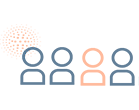Bardet-Biedl Syndrome Precision Panel
Bardet-Biedl Syndrome (BBS) is an inherited disease belonging to the group of disorders called ciliopathies, where there is a defect in primary cilia which plays a key role in sensory perception and various signalling pathways.




